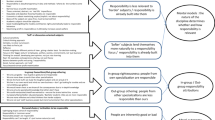Abstract
The present study examines student perception of protagonist behavior in three case vignettes. One demographic group consists of professionally employed MBA students who show characteristics of Generation X. The second cohort consists of Generation Y business undergraduates. Differences emerge between the groups. Even when they propose similar action, their respective rationale differs. Generation Xers show themselves to be astute pragmatists whose focus is on self rather than society. Yet the younger cohort, in its quest to find fulfillment, may give short shrift to some seasoned tenets of corporate conduct, including organizational mission, organizational politics, and organizational loyalty.
Similar content being viewed by others
References
Ambrose, M. L. et al.: 2008, ‘Individual Moral Development and Ethical Climate: The Influence of Person-Organization Fit on Job Attitudes’, Journal of Business Ethics 77(3), 323-333.
Bigliardi, B. et al.: 2005, ‘Organizational Socialization, Career Aspirations and Turnover Intentions among Design Engineers’, Leadership and Organizational Development Journal 26(6), 424-441.
Boyd, D. P. and T. L. Kainen: 2005, ‘Power Strategies for Middle Managers’, in S. M. Natale (ed.), The Fate of Empires: Education in a Consilient World, (Oxford Center for the Study of Values in Education and Business and Global Scholarly Publications, New York, NY), pp. 95-109.
Boyd, D. P. and M. Yilmaz: 2007, ‘Stewardship as a Factor in the Financial performance of Mutual Funds’, Journal of Business and Economics Research 5(3), 11-18.
Hira, N. A.: 2007, ‘Attracting the Twentysomething Worker’, Fortune (May 15)
Johnson, L. K.: 2005, ‘The New Loyalty: Make it Work for your Company’, Harvard Management Update 10(3), 1-5.
McCabe, D. L. et al.: 2006, ‘Academic Dishonesty in Graduate Business Programs: Prevalence, Causes, and Proposed Action’, Academy of Management Learning and Education 5(3), 294-306.
Nader, C.: 2003, ‘Generation Y: Complex, Discerning and Suspicious’, The Age (October 9)
Pham, V. H. et al.: 2008, ‘Generation Y Perceptions Study’, (Career Center California State Fullerton and Spectrum Knowledge, Fullerton, CA), pp. 1-32.
Sorkin, A. R.: 2009, ‘Is It Time to Retrain B-Schools?’, New York Times (March 16)
Trevor, C. O. and A. J. Nyberg: 2008, ‘The Effects of Downsizing on Voluntary Turnover’, Academy of Management Journal 51(2), 259-276.
Wayne, L.: 2009, ‘A Promise to be Ethical in an Era of Immorality’, New York Times (May 30)
Wood, J. A. et al.: 1988, ‘Ethical Attitudes of Students and Business Professionals: A Study of Moral Reasoning’, Journal of Business Ethics 7(4), 249-257.
Yahoo! Hot Jobs and Robert Half International: 2008, ‘What Millennial Workers Want: How to Attract and Retain Gen Y Employees’, (Robert Half International, Menlo Park, CA), pp. 1-18.
Author information
Authors and Affiliations
Corresponding author
Rights and permissions
About this article
Cite this article
Boyd, D. Ethical Determinants for Generations X and Y. J Bus Ethics 93, 465–469 (2010). https://doi.org/10.1007/s10551-009-0233-7
Published:
Issue Date:
DOI: https://doi.org/10.1007/s10551-009-0233-7




